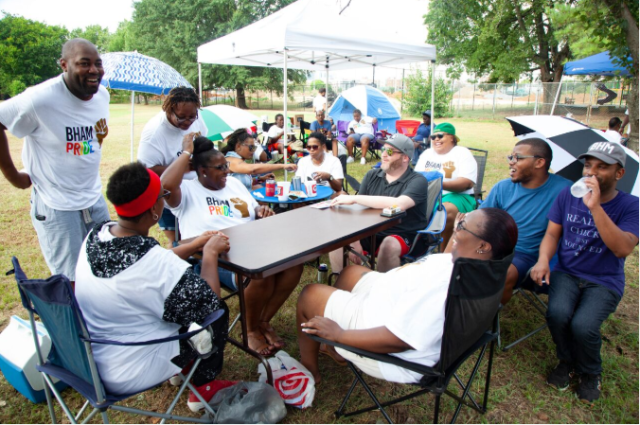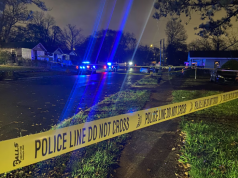
By Ariel Worthy and Je’Don Holloway Talley
The Birmingham Times
Tony Christon-Walker has HIV and is a cancer survivor.
“You get judged for having HIV, but nobody judges you for having cancer,” he said. “They’re both diseases.”
Walker, director of prevention and community partnership with AIDS Alabama, was one of the organizers for the inaugural Bham Black Pride weekend, a celebration of the city’s black lesbian, gay, bisexual, transgender, and queer or questioning (LGBTQ) community. The event, held from August 17 through 19, raised awareness and worked toward making people less judgmental.
“Being black, gay, and HIV-positive in Birmingham is hard for a lot of people,” Walker said. “I’m not a person who depends on what other people think; I really couldn’t care less. But for a lot of people—with the stigma associated with being gay, with the stigma associated with being HIV-positive, with the systematic and structural racism in the South—it’s hard to exist in certain spaces.”
Bham Pride
The gay community in Birmingham has its divisions like many other areas in society, Walker said, and that’s part of what gave birth to Bham Black Pride, which was held at locations across the city that included the Double Tree by Hilton Hotel Birmingham, Saturn Bar, and Bessie Estell Park. He was surprised by the local support and array of out-of-town visitors: about 60 percent of the people at the banquet were from Alabama cities like Montgomery and Mobile; other Southern locales, such as New Orleans, La.; and states as far away as Virginia and New York.
The weekend-long celebration kicked off with an opening awards banquet at the Double Tree, where Project Runway winner Anthony Williams was the emcee. The event, during which residents were recognized for their work in the black LGBTQ community, was more than just a gathering to honor people; it delivered a message about human immunodeficiency virus (HIV) prevention, as well.
“People need to know that HIV is still an issue, and it doesn’t have to be,” Walker said. “We have a lot of different ways to prevent HIV, one being PrEP, a pill that people can take to help prevent HIV.”
Awards
Among those recognized at the opening banquet was Tori Wolfe-Sisson, cofounder of BLK Pearl—an organization for black, brown, and indigenous transgender and queer women—who won the Advocacy Award. Wolfe-Sisson and spouse, Shante, were the first same-sex couple to get married in Alabama in 2015, and Wolfe-Sisson was glad their work was noticed.
“A lot of the work I do is public, but it’s so thankless,” Wolfe-Sisson said. “I interact with so many individuals that I don’t often notice when a collective of people see and appreciate what I’m doing.”
Patrick Packer, winner of the Trailblazer Award, was honored for his work as the director for Project 601, an HIV-prevention program at the University of Alabama at Birmingham (UAB) School of Public Health. He said Bham Black Pride is important because of the stigma associated with HIV and AIDS.
“It was nice to have so many young people who participated in the project come back to talk about HIV prevention,” Packer said. “We know that HIV and AIDS are still hitting the black gay community at alarming rates, so it’s good to see this work come back and save lives.”
Panel Discussion
The weekend also included a panel discussion titled “The State of the Black LGBTQ in Alabama,” which was moderated by Marvin Anderson, an HIV survivor, activist, and communications director for the Southern AIDS Coalition (SAC). Panelists included Christon-Walker and Wolfe-Sisson, as well as African Methodist Episcopalian (AME) minister the Rev. Robyn Burnett and transgender activist Karina Harris.
So, what is the state of the black LGBTQ in Alabama? The word “lonely” seemed to come up frequently.
“We need each other. We need inclusion. We need an alignment,” said Anderson, a self-described “same-gender-loving man of color,” who was previously married to his son’s mother for 14 years before recently embracing his true sexual orientation two years ago.
“We have not assimilated. Because we have not done so, our voice is not heard. It doesn’t have the magnitude, … it doesn’t have a pinnacle on which it can be heard,” he said.
“Right now, we’re in the process of a call to action. Once we gain an assembly, then we can do things that bring change and can get us what we need. We can evolve. We can fix poverty and social welfare. But we can’t do it until we become a solid voice.”
Wolfe-Sisson used the word “lonely” because the community doesn’t have safe spaces to find their “people.”
“We haven’t talked enough about the social spaces we have access to as black queer people,” Wolfe-Sisson said. “As a black, queer, fem-passing person, we’re treated like pets at establishments in the city. … We are touched in ways that are completely disrespectful and inappropriate. … [People] say things like ‘I want to touch your hair,’ ‘I want to lick your skin,’ ‘I want to see if your butt is real’; they ask, ‘Are those your breasts?’ These are completely rude, invasive, and uncomfortable situations we’re put into because we’re marginalized people, on top of the other aspect of our marginalization,” including the poverty, disparities, and disadvantages faced by blacks.
“That’s why the [weekend] is important,” Wolfe-Sisson said. “[Bham Black Pride] is a response to the minority stress that we’ve been forced to experience and live with because we don’t have access.”
Often Forgotten
The event is crucial for a number of reasons. One is that blacks are often forgotten, Walker said.
“Just in the last five years with marriage equality taking place, we’ve seen a lot of people who don’t look like us have space and say ‘Hey, we’re here, we’re LGBTQ.’ … We get it from two ends: we get the racism and homophobia that are systemic within the black community.”
It’s hard for kids to come out to their parents, but it’s even harder for black kids, Walker said.
“Part of the work I do in HIV prevention is making sure kids are housed because in the black community kids are still getting thrown out of the house for identifying as gay, bisexual, or trans,” he said. “I still don’t know how parents can throw their child out and say they love Jesus, but that’s where we are.”
This story was updated on 8/23/2018 at 4:20 p.m. to correct pronouns.



